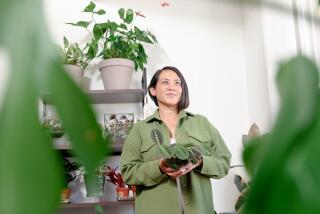Transplants Are for Flowers
- Share via
It was late by the time Ellyn Windsor arrived home, and the red light of the telephone answering machine blinked into the early darkness. She hesitated for a moment then listened to the message. A voice said, “This is the UCLA Medical Center transplant coordinator. We have a heart for you. . . .”
The time had come. Six months in a twilight world, suspended between life and death, were nearing an end. Waves of excitement and terror washed over her. Soon, a stranger’s heart would beat in her chest. Soon, the terrible waiting would be over.
Windsor telephoned her son, her brother and two women transplant patients who had become her friends and her support group. Together, they went to UCLA Medical Center.
An air of calm settled in as a pre-op procedure began. All Windsor knew was that the donor heart was that of a 26-year-old female. There were X rays and blood tests. IVs were put in place.
“Everyone was gentle and excited,” Windsor remembers. “They talked about a new beginning.”
The operation was scheduled for after midnight. At 11:30, two surgeons entered her room. “We have news,” one of them said. It wasn’t good.
They had examined the heart that was to have been Windsor’s. The donor had hepatitis-B. The transplant was off. “Go home,” a surgeon said, “and we hope it will happen soon.”
Ellyn Windsor, normally ebullient, normally optimistic, plunged into two days of terrible despair. . . .
Waiting is the hardest part.
It began with the second of two massive heart attacks last July that left her with only 30% of her heart functioning.
At 51, Windsor was looking death squarely in the eye. Her father, a heavy smoker, had died at age 54 of a coronary. By smoking four packs a day for 25 years, she was chasing his ghost to the grave.
Stress was also a part of her life. As a professional fund-raiser for the Boy Scouts, she was never at ease. A dinner every two weeks for 800 donors kept her in an endless blur of planning and arranging.
Windsor is divorced and self-supporting. She raised two children on her own and now lives alone in a condo on the edge of Bel-Air, proud of her ability to make it without anyone’s help.
But now she needs help of a different kind.
After the second heart attack, the head of UCLA Medical Center’s transplant unit said they ought to discuss a transplant.
“I said are you crazy?” Windsor remembers. “Transplants are for flowers and trees, not for me. The doctor looked at me and said, ‘That’s the only way you’re going to live.’ ”
At that moment, Ellyn Windsor became one of 45 patients at the center and 2,701 nationwide waiting for a donor heart.
They gave her a beeper to alert her when a new heart was available. Meanwhile, she lost 55 pounds and quit smoking. She took a medical leave from her job and began seeing a therapist.
Now she waits.
“It’s always on my mind,” she says, tears forming in her eyes. “Shopping, driving, seeing a movie. I think about it all the time. I wake up in the middle of the night or look in a mirror and ask, ‘Why can’t I be normal?’ ”
She won’t go to malls because she fears she’ll have a heart attack and they won’t be able to find her. At the same time, she dreads being alone and helpless if it comes.
“She’s facing death,” a Medical Center spokesman said. “She knows that.”
She does indeed. Hundreds of patients waiting for transplants don’t make it. “I want to ask how long I can go on without a new heart, but I’m afraid,” Windsor says. “I don’t want to know the answer.”
The beeper went off once, sending chills through her. It was an accident. The unit needed new batteries. For some reason, that triggered a different thought process. Up until then, she had been thinking about a new heart.
Then it hit her. Someone had to die for her to live.
“I’m actually waiting for a person’s death,” she says, not quite believing it. “That hurts. It will probably be someone younger than me. They won’t have the life I’ve had. Why does it have to work that way?”
She thinks about people driving motorcycles in the rain and all the shootings downtown. And, despite her uneasiness about the trade of a stranger’s death for her life, a survival instinct kicks in. “I find myself wondering, why haven’t I been called? Why hasn’t my phone rung?” And then it rang that day two weeks ago, but the transplant wasn’t to be. The waiting goes on.
Transplants are for flowers, Ellyn Windsor said. But she knows now that, in this era of medical miracles, they are also for all things that wait and wilt under the cold sun of an approaching spring.
More to Read
Sign up for Essential California
The most important California stories and recommendations in your inbox every morning.
You may occasionally receive promotional content from the Los Angeles Times.













